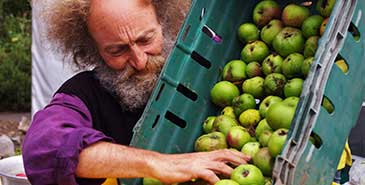The Bee and Pollination Festival will take place at the University of Bristol’s Botanic Garden at The Holmes, Stoke Bishop, Bristol, on Saturday 6 and Sunday 7 September 2014 from 10 am to 5 pm.
This year’s theme focuses on the importance of pollination for growing fruit and vegetables and a transient fruit orchard will be at the festival with experts on hand to answer fruit growing techniques.
The University of Bristol’s School of Biological Sciences will also showcase its Urban Pollinators project, which is examining how pollinating insects are affected by urbanization.
Nick Wray, Curator at the Botanic Garden said: “Researchers at the University of Reading have calculated that the total value of crops pollinated by insects in the UK was an estimated £510 million per year, yet the estimated annual cost of replacing pollination services provided free by insects with hand pollination would be in the region of £1.8 billion per year.
“This event will highlight the important role that bees have in pollinating plants and the numerous ways in which we can help them to carry out this vital role.”
The festival will also host the Bristol Branch of the Avon Beekeepers Association annual Bristol Honey Show and Festival. A live hive will give visitors an insight into the workings of the honey bee along with talks and displays on the importance and pleasure of keeping bees. While honey is a major feature, exhibitors will also explain the significance of beeswax and other bee products.
With the increase in people growing their own food and community urban food projects, the allotments team at Bristol City Council and the Avon Organic Group will show visitors how garden displays can be improved.
Tours will be offered throughout the weekend that will give people the chance to see and learn something new about the garden, which will be ablaze with September colour, including many autumn flowering salvias, anemones, grasses, toad lilies and hardy bromeliads.
Free demonstrations and talks will take place throughout the festival, which will range from beekeeping techniques and the workings of a live hive, to research projects about urban pollinators, how to build insect hotels and weave enchanting willow sculptures.
On the Sunday [7 September], Mike Feingold of Royate Hill Community Orchard and a tutor on the Bristol Permaculture Design Course, will be demonstrating apple pressing and mashing and visitors are invited to bring their own apples to make their own juice.
The RSPB will showcase their successful Dungeness project that involved reintroducing a bee which was declared extinct in the UK in 2000. The short-haired bumblebee, brought over from Sweden, has now nested and has produced its first offspring.
The festival will not just focus on UK issues. In line with the Botanic Garden’s mission objectives, to educate, communicate and conserve, a display by Bees for Development (BfD) will demonstrate how it undertakes practical projects overseas to develop people’s knowledge of how to create reliable income from bees and beekeeping. A couple of bee colonies can generate income that allows a family to buy essential medicine or send a child to school.
Exhibitors at the event include Butcombe Brewery and Mad Apple Cider, who will be providing beer tastings and Riverford Organic Farms will explain their organic growing story. Orchid enthusiasts, including Writhlington School Orchid Project and Kelvin Bush orchids, will show the relationship between pollinators and flowers in a display of orchids.
Bristol Naturalists will give advice on identifying bees and Friends of Downs and Avon Gorge will explain how they protect and enhance the area for the benefit of wildlife. The Bumblebee Conservation Trust will show, whatever the budget, how people can make their gardens more bee-friendly. A number of nurseries will also be selling insect-friendly plants for all types of gardens, such as hardy exotics seen in the Botanic Garden or the Jurassic giants in the garden’s Evolutionary Dell.
Art displays include metalwork sculptor, Willa Ashworth, who will be bringing unusual bird feeders, fire pits and wind chime flowers; Botanic Garden art tutor, Jenny Brooks and Forever Knowledge bee products.
The Bee and Pollination Festival at the University of Bristol’s Botanic Garden, The Holmes, Stoke Park Road, Stoke Bishop, Bristol BS9 1JG, will take place Saturday 6 and Sunday 7 September from 10 am to 5 pm. Light refreshments will be available.
Entry to the festival is £3.50 adults; free to University staff and retired staff, Friends of the Botanic Garden, students and children under-16.
For further information tel 0117 331 4906 or email botanic-gardens@bristol.ac.uk
